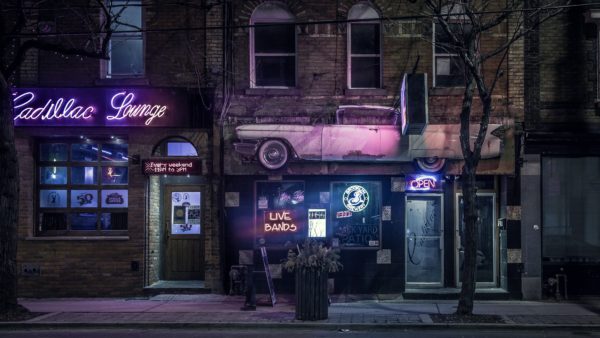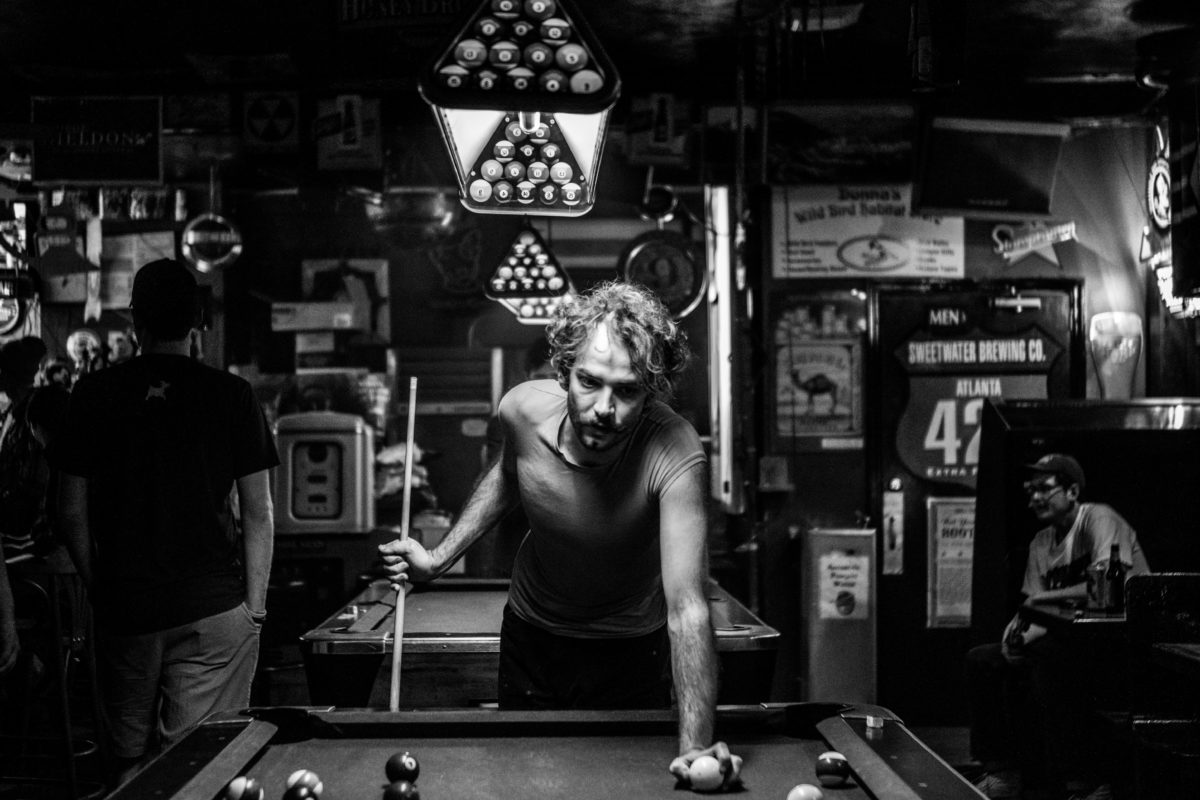In July of this year, Rolling Stone published an article about pop star Olivia Rodrigo’s impromptu performance at a “U.K. dive bar” called Bunny Jackson’s. The meticulously branded Manchester club is slathered in tropes of Americana: bourbon, cheap wings, and an unhealthy obsession with corrugated siding. “I’m dead sober,” Rodrigo told the audience, seemingly self-aware of the strangeness of this moment set against the dive bar backdrop. Must a person be drunk to be in a dive? Of course not. But the comment seemed to underscore the awkward tension between Bunny Jackson’s shabby-chic marketing scheme and the hard-won authenticity of an earnest dive.
The question of self-defined dive bars came up for me again in September when Food & Wine published an article titled “NYC’s First Sober Dive Bar is a Very Good Time.” A video on the magazine’s Instagram page shows off a quaint and kitschy Manhattan spot with bar mats branded by Aperol Spritz and Deep Eddy Vodka, despite having a back bar stocked exclusively with non-alcoholic spirits. These alcohol-free products have become a legitimate part of the conversation for most serious bar programs in America, but there was something about the “sober dive bar” moniker that I found grating. Again, it wasn’t the focus on sobriety that bothered me as much as its using the allure of a dive as a marketing ploy. Whether a sober space lends itself to being a dive bar is probably a much larger conversation.
To be called a “dive bar” is a dubious honorific. The title appears to have originated from the eponymous Dug’s Dive, founded sometime in the early nineteenth century in Buffalo’s Canal District by William Douglas, or “Uncle Dug.” It was a filthy and often dangerous place by today’s standards, but it was also a place of refuge. Dug, a former slave, was known for providing food and shelter to Black men in need. After the passing of the Fugitive Slave Act in 1850, that need could be very real, and “dives” like Dug’s were places where the well-heeled were unlikely to travel and police would pay no mind. This act of charity and community along the fringes of polite society unknowingly set the foundation of what would define dive bars in the modern era.

Dive bars are deeply loved institutions, regularly full of passionate patrons who have a sense of individual ownership of the place. Like most tribal environments dive bars can be moderately unsafe to outsiders, with their own customs that normal bars might not abide. And while assaults, theft, and occasionally worse can happen at dive bars, they rarely happen to members of the community who occupy them. As a bartender, I once admonished a young man that I’d cut off who was on the verge of doing something about it: “If you try to jump over this bar, either I’m going to get you,” then I nodded to the room full of regulars who had all grown quiet, “or they will.”
What marketers, trendsetters, and even many bar owners fail to grasp is that a “dive bar” is more than an aesthetic. It’s not something that can be papered on the walls or adopted by fiat. No amount of corrugated siding, expired license plates, carved initials, or sliced-up posters and stickers will turn a regular bar into a dive bar. A popular magazine can’t simply anoint a trendy new concept a subspecies of dive. In fact, the moment a place is written up as a “great dive bar,” its dive bar credentials suffer until, after a couple of months when tourists invariably grow tired, the regulars return.
There are no great dives, no new dives, no sober dives, no all-ages dives, and certainly no fucking cocktail dives; there are simply dives. Does the beer taste a little warm? It’s probably because the keg cooler has been begging for a new compressor for years, but the owner just needs to get through the next payroll. Your glass has a chip? Drink around it. If you insist on telling the bartender, wait until you order a new round, so they don’t just refill the same pint. But be warned that the next glass might be coming hot out of the dishwasher. You get what you get in a dive bar.
Like the people who inhabit them, dive bars don’t care what you think and only nominally care about what you want. Depending on the day they may be too tired, too old, or simply too hung over for your shit today. This is probably why so many bartenders occupy dive bars during their off hours. For people who clench their teeth every day at work serving clueless twenty somethings, indecisive bachelorette parties, creepy old men expecting a smile, and bros demanding shots then fumbling with their wallets when they hear the price, we sometimes need a break. We find respite existing in places that don’t suffer fools, where decorum is defined by minding your own business. Dive bars are places, perhaps the only places, where we know we can be pensively silent or absolute goblins entirely without judgement. If bartenders have safe spaces, they are dive bars.
Please bear this in mind when your excitable friends say they’re taking you to a great dive to get you out of your shell after a breakup. Because they are not. They’re taking you to a regular bar. With all due respect to your friends, dives aren’t for breaking out of shells, they’re for getting cozy within them.

Earlier this year, Miller High Life collaborated with an alcoholic ice cream brand called Tipsy Scoop to release a small run of “High Life Ice Cream Dive Bars.” The 5% ABV ice cream is flavored with actual High Life beer, chocolate, caramel, and a peanut swirl, to evoke that “distinct sticky dive bar floor feeling.” A sprinkle of carbonated candy emulates the spritz of a freshly drawn pint of shitty beer. I normally try to avert my eyes when niche companies and ad execs for beverage monoliths pander for press, but this one got under my skin. “Who wants to lick the carpet where Jerry pissed himself?” I wondered aloud.
It’s unfair to pigeonhole dive bars as purveyors of inferiority. In truth, some dives offer delicious meals at prices so low it’s hard to comprehend. They’re irreplaceable domains of local culture where income, social status, fame, and everything else don’t matter for at least the time you spend within their four walls. They’re great equalizers. The staff of a dive loves the bar like it’s been in their family for generations, and there’s a good chance it has been. The regulars of a dive have been coming to them since they could drink. If they moved away, they never fail to return on a visit.
Popular non-dive bars have a different culture. They’re where you go to be seen, to experience a new trend, or to impress a client or a date. Sometimes they’re just where you go to have a great time and watch the game. Not being a dive bar does not make a place lesser. But dive bars have history and community. They’re where a person can turn when they have nothing and need a place to be. They’re bars where your mother can point to the corner stool where your grandfather always sat. They’re the keepers of the “remember when.”
About ten years ago a journalist for a local publication asked me where I liked to go to drink, and I answered honestly. I told him about the dive that I spent a couple of nights a week at, where I knew I would never see a regular from my bar and rarely even another bartender except for those like me who were chasing the sunrise. I regretted it. It was uncomfortable to see this place, with the felt on its pool tables shredded and its stage for shows little more than a stack of combo amps, spin through a culture rag. Because it already had a culture, and it didn’t need a new one. When its building was finally sold, demolished, and rebuilt into a glass-walled coffee shop, I promised myself that I wouldn’t do that again.
Because dives deserve to exist, to flourish, and sometimes to be torn down to their foundations based on their own merits and existing as much as they can by their own rules. We lessen them, and to some degree ourselves, by asking them to be something different.


Fabulous article. You wrote down everything we feel but couldn’t put into words.